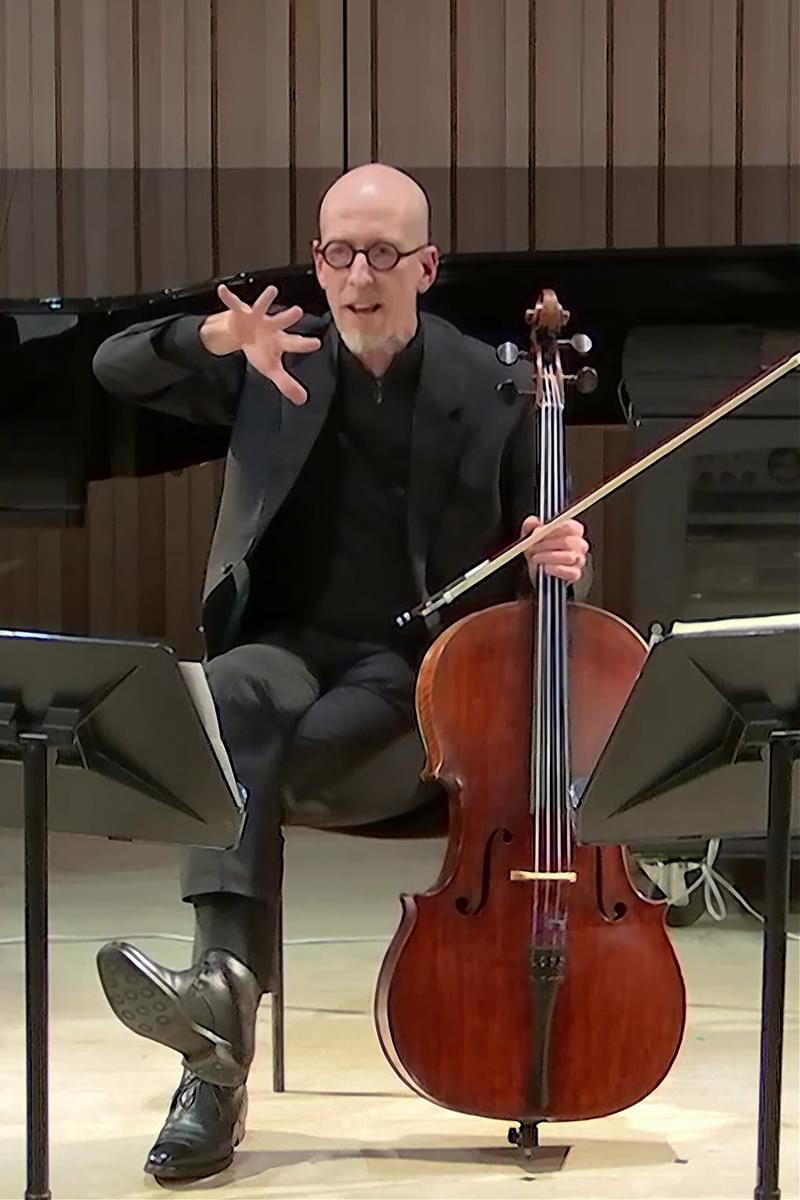Neil is the cellist of the Kreutzer Quartet and Head of Postgraduate Programmes at the Royal Academy of Music
As a cellist, Neil has made more than 40 recordings spanning music from the 17th to the 21st centuries, expanding the quartet and cello repertoires through exploratory collaborations with composers and by championing music from outside the mainstream. His research is concerned with the ways in which musicians communicate with one another – and with exploring relationships with instruments. Neil has been Visiting Professor of Artistic Research at the Sibelius Academy in Helsinki and is currently a Visiting Professor at the Bartlett School of Architecture, University College London.
Neil has been invited to give keynote lectures at major events internationally, exploring both his own work and avenues for the future of practice research as a discipline. Working with a team of exceptional colleagues, he has overseen the development of a distinctive practice research culture at the Academy that is intimately linked with the core activities of the institution. As a contribution to the UK’s practice research sector he served as member of the REF2014 assessment panel for Music, Dance, Drama and the Performing Arts.
Following a doctoral thesis on Debussy’s three late sonatas, Neil’s research has focused on composer-performer collaboration and instrumental choreography, the latter exploring the ways in which the actions of performance are not merely means to sonic ends but expressive in their own right. This work was published in articles and films, including a documentary about, and film of, Brian Ferneyhough’s Time and Motion Study II (1972-76) and a DVD with commentary with the Kreutzer Quartet titled Quartet Choreography, exploring iconic 20th-century quartet repertoire (Stravinsky, Lutoslawski, Ligeti) and a new commission for the project by Michael Finnissy.
He is currently completing a critical edition of Debussy’s three late sonatas for the Œuvres completes de Claude Debussy in Paris and working on a series of interconnected projects that explore some of the ways in which instruments are ‘not just tools’. A lecture and performance of Michael Finnissy’s Chi Mei Ricercari for cello and piano (given on seven cellos from the Academy’s collection) is available on the Academy’s website, exploring the idea of the instrument.
Inner Life of the Cello | Royal Academy of Music (ram.ac.uk)
His teaching draws extensively on recordings as means for discovering the richness of musical relationships. A disc exploring microtimed relationships with iconic recordings, made in collaboration with the American composer Richard Beaudoin, was released in 2023.
In September 2013 Neil was appointed as a Professor of the University of London at the Royal Academy of Music.
Supervision
Neil has supervised more than twenty completed doctoral projects (as principal supervisor) and examined extensively internationally as a leading figure in practice research. Current students are exploring contexts and editorial issues for Weinberg’s cello music, approaches to ‘opening’ new ways of realising J.S Bach’s music on the cello, and reinventing the ‘Caprice’ for the natural horn through composer collaborations. Recent completions include projects exploring major figures from the Academy’s past (Émile Sauret, violinist, and Alfredo Piatti, cellist), an exploration of the last generation of the simple-system oboe in France, and ‘reimagining’ Schubert’s ‘strangeness’ through collaborations with composers. Projects exploring the nature of instruments, collaborations with composers, aspects of recording practices/legacies, and editorial work are welcomed!
Selected Publications
Richard Beaudoin: Digital Memory and the Archive, Neil Heyde solo cello, with Rohan de Saram, cello (New Focus Recordings FCR 358, 2023)
‘Dialogues with Recordings: Digital Memory and the Archive’, chapter in The Routledge Companion to Applied Musicology, ed. Chris Dromey (Routledge, 2023)
‘A “naked violin” and a “mechanical rabbit”: exploring playing relationships in Ravel’s Sonata for Violin and Cello (1922)’, in The Chamber Musician in the Twenty-First Century ed. Mine Doğantan-Dack, (MDPI, 2022)
Mihailo Trandafilovski: ‘Polychromy’ for solo cello (dedicated to NH), on Polychromy (Metier MSV 28629, 2022)
David Matthews: Complete String Quartets, Volume Five, String Quartets 13, 14 and 15, and arrangements and canons (w. Kreutzer Quartet) (Toccata Classics, TOCC 0554, 2022) First recordings
Simon Bainbridge: Chamber Music (String Quartets nos. 1 and 2, Cheltenham Fragments, Clarinet Quintet (w. Kreutzer Quartet and Lina Merrick Clarinet) (Toccata: TOCC0573, 2021) First recordings
‘Listening to the ‘instrument:’ a performer’s response to Michael Finnissy’s music for string quartet and the Chi Mei Ricercari for cello and piano.’ In Bright Futures, Dark Pasts: Michael Finnissy at 70, ed. Ian Pace and Nigel McBride (Routledge, 2019)
Michael Finnissy: Civilisation (2004/13), Contrapunctus XIX (2013), Clarinetten-Liederkreis (2016), Mad Men in the Sand (2013) Six Sexy Minuets Three Trios (2003) on Six Sexy Minuets Three Trios (w. Kreutzer Quartet and Linda Merrick, clarinet) (Metier MSV28581, 2018)
‘Why? What? Where? Questioning the responsibilities of researchers and environments in self-reflexive work.’ Invited keynote for ‘Beyond 'mesearch': autoethnography, self-reflexivity, and personal experience as academic research in music studies', Institute of Musical Research conference, London, April 2018.
Amanda Bayley and Neil Heyde: 'Communicating through notation: Michael Finnissy’s Second String Quartet from composition to performance.' Music Performance Research, vol.8 (2017) ISSN 1755-9219, pp. 80-97
